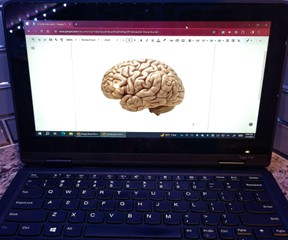There is no doubt that BCIs (Brain Computer Interfaces) are a revolutionary piece of new technology. However, they aren’t going to work for every non-verbal person, in some cases of autism, nor for people with very severe brain damage. They also claim to have the ability to cure depression. According to an article by Nature, in a 2020 interview with Joe Rogan, Elon Musk stated that BCIs ‘could in principle, fix almost anything wrong with the brain’.
A quick synopsis of brain computers: they are devices that can either be implanted in the brain or just worn on the surface of the head, similar to a swim cap. They detect neural signals within the brain and encode those signals into words a person thinks of saying. These words are then spoken by a digital avatar of that person, enabling a non-verbal person to speak. This is where the limitations can start to appear. This device may only be able to encode thoughts for neurotypical people who may have become non-verbal due to a stroke or other factors. For those who are not neurotypical, such as in cases of autism, this device may be ineffective. This is because of verbal stimming, which is common in those who are autistic. Verbal stimming is just the repetition of a word over and over. It’s something that autistic people who can describe it say it is something they feel they have to do.
If verbal stimming affects those with autism, it could affect those who are non-verbal and autistic. Although they may not express the words, the neurons still fire to produce the thought of repeating that word. In an interview with Ashlynne Gerstberger, the speech pathologist at Pennridge High School, she mentioned that she would think the words would repeat on the computer, just as if a verbal, autistic person was stimming and saying them. An additional limitation of this technology is with people who have very severe brain damage. According to the National Library of Medicine, neurons are believed to be permanently gone after they die. Although there is a theory of neurogenesis, nothing has been proven. This means when someone sustains a severe brain injury or a disease attacking the brain, and these neurons die, they could be gone indefinitely. If these nerves are dead, then they will no longer work to transmit electrical signals throughout the brain. BCIs rely on the detection of neural signals to function. If there are dead neurons in Broca’s area, the part of the brain responsible for the formation of speech, then the device may not be able to encode speech successfully.
Claims have been made that BCIs could cure depression. However, people remain skeptical. In an interview with Pennridge High School’s psychology teacher, Stephanie Nash stated, “I think they [BCIs] could help to alleviate symptoms but not cure things overall. Too much is unknown about mental health. To activate each individual spot in each person’s brain would be too difficult.”. Nash stated it perfectly. There is not enough information known about depression to have some device completely cure someone. One of the ways that this device could be effective is if there were a way for it to increase the release of serotonin ( a serotonin imbalance is associated with depression). Unfortunately, there isn’t an accurate way to measure neurotransmitters, according to an article by Verywell Health. Even if measuring the number of neurotransmitters present in the body becomes possible, these devices would then have to stop neurotransmitters at the synapses, the end of a neuron where neurotransmitters are released, and somehow prevent them from transferring across the synaptic cleft, the space between the end of one neuron and the start of a new neuron. At this moment, this technology just isn’t feasible.
Despite limitations and lack of current technology, if these devices could be updated with the coming of new technology to reduce the limitations, it would be a fantastic breakthrough for neurodivergent non-verbal people. When discussing if these devices would be rewarding, Gerstberger stated, “I do, I definitely do, that communication is the key to life.”.
Sources:
https://www.nature.com/articles/d41586-023-03423-6





